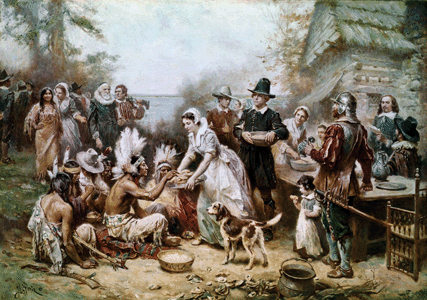Nov. 21-27, 2013, Current Events Lesson Plan
Current Event:
This year’s Thanksgiving Day will be the 150th year the holiday has been officially celebrated in the United States. In 1863, President Abraham Lincoln, persuaded by magazine editor Sarah Josepha Hale declared the fourth Thursday in November to be a day of thanksgiving. Although the 1863 Thanksgiving was the first official celebration of the national holiday, the holiday also honored the Thanksgiving the Pilgrims of Plymouth Colony shared with friendly Indians in 1621. The Pilgrims, who immigrated to the New World in 1620, barely survived their first winter in what would come to be called New England. In the autumn of 1621, the governor of Plymouth, William Bradford, organized a three-day festival to give thanks for the survival of the colony and for its first harvest. The Pilgrims’ Thanksgiving feast stemmed from a tradition of harvest festivals held by English country folk. On Michaelmas Day (the feast day of St. Michael, September 29), country people would hold a large, communal harvest supper, giving thanks for the crops that would sustain them over the winter.

The "first" Thanksgiving was celebrated in Plymouth, in 1621. (An oil painting on canvas from about 1919, by Jean Leon Gerome Ferris; Smithsonian Institution, Washington, D.C.—Corbis/Bettmann)
Objective:
Holidays are any days on which people lay aside their ordinary duties and cares. The word comes from the Anglo-Saxon halig daeg, or holy day. At first, holidays honored some sacred event or holy person. Some holidays, such as Christmas, Easter, and New Year’s Day, are celebrated throughout the world. Thanksgiving Day is a day set aside each year in the United States and Canada for giving thanks and remembering the blessings of life. For thousands of years, people in many parts of the world have held harvest festivals. The American Thanksgiving Day grew out of these harvest home celebrations. For this reason, the holiday takes place late in the fall, after the crops have been gathered. Today, the fourth Thursday of November is observed as Thanksgiving Day in the United States. The first Canadian Thanksgiving was celebrated in Newfoundland in 1578. The English captain Martin Frobisher held a ceremony to give thanks for surviving the long sea journey from England. Today, the second Monday in October is celebrated as Thanksgiving Day in Canada. The Behind the Headlines news stories and related World Book articles explore Thanksgiving Day and other holidays.
Words to know:
- Abraham Lincoln
- Feasts and festivals
- Holiday
- Michaelmas
- Pilgrims
- Plymouth Colony
- Sarah Josepha Hale
- Sir Martin Frobisher
- Squanto
- Thanksgiving Day
- Wampanoag Indians
- William Bradford [1590-1657]
Discussion Topics:
1. Ask your students to name some holidays and festivals celebrated around the world. (Students might say Australia Day, Bastille Day, Boxing Day, Canada Day, Christmas, Diwali, Easter, Halloween, May Day, New Year’s Day, Saint Patrick’s Day.)
2. Ask your students what is their favorite holiday and why.
3. Many U.S. retailers have begun opening their stores or offering special sales on Thanksgiving Day. Three states, Maine, Massachusetts, and Rhode Island, ban most stores from being open on Thanksgiving Day. Ask your students to debate, “Retail stores should be prohibited from opening on Thanksgiving Day.”
4. Ask your students to use World Book’s Timelines feature to create a timeline of the history of Thanksgiving. (Students may wish to use World Book’s Thanksgiving Day article for help.)


